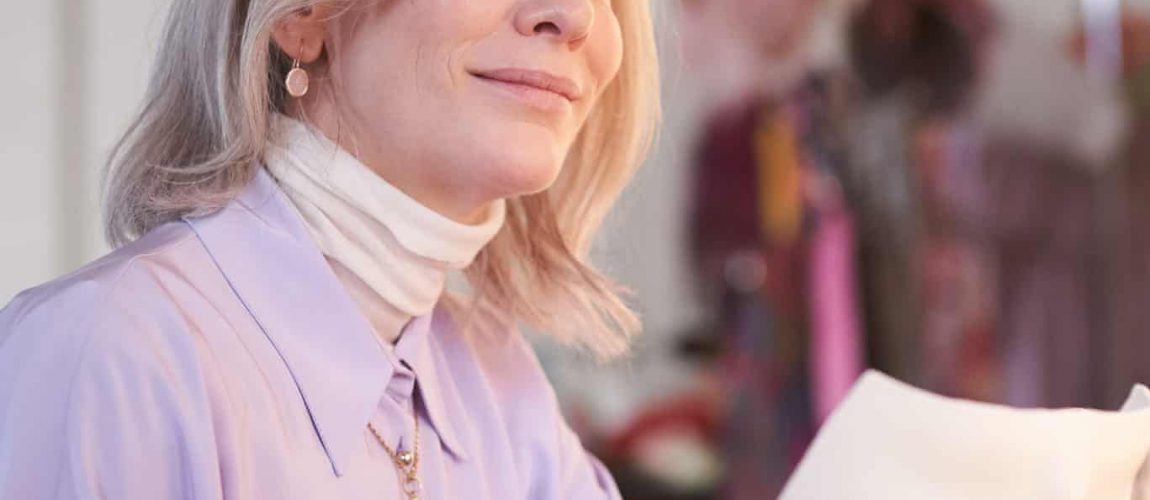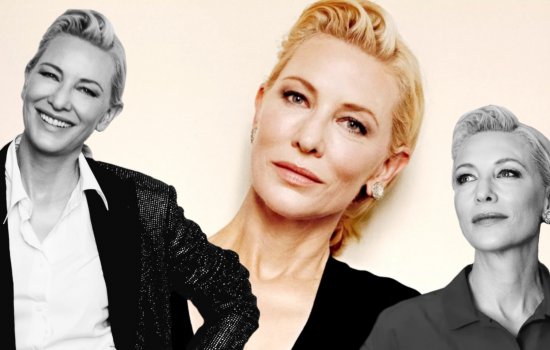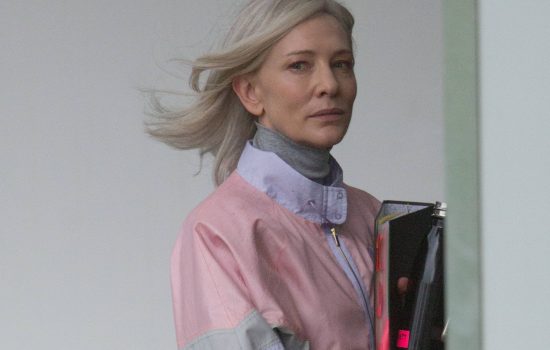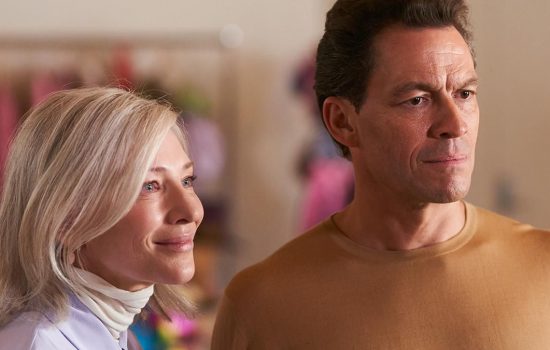Hello Blanchetters!
Stateless is about to premiere in Berlin in two days; Cate Blanchett will be promoting the tv series from tomorrow.
Cate is Pat Masters (and not Cornelia Rau, as we wrongly reported before), runs a cult named GOPA – Growing One’s Potential Achievement. Dominic West plays her husband.
Several Australian newspapers have published new pictures and interviews to promote the upcoming TV series, set to premiere on March 1, 2020. We are posting some extracts of them.
Down below you can watch a video interview recorded in December 2019, a new poster and a brand new photoshoot for The Hollywood Reporter. Enjoy!
Video interview (original source)
Actress Cate Blanchett
As a co-creator of the new ABC series Stateless, Cate Blanchett hopes to challenge Australian attitudes towards asylum seekers, particularly as the climate crisis threatens to displace many more people. “The rhetoric of protection and the language has separated Australians from their humanity, and encouraged the public through a lack of transparency in information to tolerate or ignore human rights abuses that are going on offshore.”
Prowling the boards of The Arts Theatre, a rectangular light-blue brick building opened for amateur repertory productions in Adelaide in 1963, Cate Blanchett is about to give a tightly controlled performance, fronting a small jazz-swing band. Her hair is in a silver bob, her red lipstick thickly applied. Holding a microphone in her right hand as the left holds the train of her sparkly off-the-shoulder gold dress, she sings “Let’s Get Away from It All”, a number popularised by Frank Sinatra and Rosemary Clooney: Let’s take a boat to Bermuda, let’s take a plane to St Paul …
Blanchett’s singing is mellifluous and her hips are swaying, but the context of this scene, set in the early 2000s, is ironic and grotesque. She’s playing Pat who, alongside her husband Gordon (Dominic West of The Affair), runs a cult named GOPA – Growing One’s Potential Achievement – and at this eisteddfod, Pat announces one of the fee-paying acolytes dancing in the hall will be awarded the “trophy of transformation” for having opened themselves up.
Five years ago, in the kitchen of her home in Sydney’s Hunters Hill, Blanchett and her high school friend Elise McCredie were talking about their shared interest in the global displacement crisis, particularly after the September 11 terror attacks and the Howard government’s refusal to allow the MV Tampa and the 433 refugees onboard to enter Australian waters in 2001. Blanchett’s original idea was sparked by the true story of an Australian woman who fell through the cracks of the mental health and criminal justice systems and was erroneously locked up in immigration detention.
Blanchett, in Toronto while filming a new Guillermo del Toro film, Nightmare Alley, says she wants Stateless to pose questions “rather than be a piece of agitprop that proposes answers”. Blanchett and McCredie, who co-created Stateless with Tony Ayres, emphasise this story is “inspired by” rather than “based on” true events, and that the characters are amalgams. The initial real-life inspiration is clearly Cornelia Rau, locked up for 10 months in 2004 and 2005, but Stateless is not Rau’s story, and Blanchett purposefully avoids mentioning Rau’s name.
“There was a genuine asking, ‘How did this happen?’ and ‘Why did this happen?’ ” recalls Blanchett, now based with her playwright husband, Andrew Upton, and their four children in East Sussex, Britain. “We then got fascinated by everyone else who touched the system. Australia is an intellectually, culturally rich place, visually rich, it’s resources rich, but the rhetoric of border protection has been exported to Britain, to UKIP [the United Kingdom Independence Party], to the wall [with Mexico] that’s being built in the US, to what’s happening in Italy, Greece and Turkey. It’s a global story. It’s not geo-locked to Australia.”
“The notion of nationhood is rarely peaceful, or forward-looking, and so what we’re trying to do is reverse-engineer how we got here as a so-called nation, and what we’re prepared to tolerate.”
Blanchett’s character Pat sings “Ac-Cent-Tchu-Ate the Positive”, a Bing Crosby favourite, in the show’s opening moments, suggesting a big bubble of denial. In a later scene, though, she lingers in the upstairs theatre window looking down at Sofie’s sister Margot (Marta Dusseldorp), who is searching for her sibling. Is Pat also a victim of circumstance?“Elise kept saying to me, ‘Pat is Australia,’ ” says Blanchett, laughing. “Very few of us step away from the window. How did she get there, and at what point do we decide to bear witness to things that we know [are] happening but we feel we don’t have any responsibility to do anything about? … There’s no country that’s not like this, but there are dark sides to sunny Australia. It’s whether we play to that, or speak to our better natures.”
Read more here
Cate Blanchett on global politics and immigration detention: ‘You’re living in a system that’s gone mad’
Blanchett’s star-powered TV series Stateless explores the repercussions of Australian policy. ‘None of us are interested in preaching to the converted,’ she says
As an Australian working abroad, Cate Blanchett never found it easy talking about her home government – in particular, the trauma it has inflicted on asylum seekers in need.
“They knew nothing about the Tamils on the roof, nothing about children sewing their lips together [in detention centres],” Blanchett says of her American friends. “They would actually start with nervous laughter because they thought I was exaggerating.”
We meet in Adelaide in 2019, where she is filming scenes for the upcoming series Stateless. Premiering next week at Berlinale before landing on the ABC on 1 March, the six-episode show – co-created by Blanchett, Tony Ayres and Elise McCredie – takes a deep dive into Australia’s controversial immigration policies.
“There’s a profound anxiety about where we’re all heading and the erosion of empathy and, of course, that’s the space where the drama takes place,” Blanchett says, during an interview with all three co-creators. “None of us are interested in preaching to the converted.”
Read more here
At the mercy of others
The ABC’s Stateless, a collaboration between Cate Blanchett and prominent industry friends, focuses on Australia’s immigration system.For all the passion of the creators, Blanchett avows their purpose was never merely polemical, more concerned she says in a production statement with the dialogue the series may incite among its viewers: “I think the second part – and perhaps the even more important part – is scaffolding a non-fear-based, inclusive, interesting, engaged, forward-looking conversation around the questions this series asks.” Ayes echoes this notion saying, “It would’ve been very easy to do an agitprop piece and we were very conscious of not doing that from the outset”.
Read more here
Stateless explores the human cost of Australia’s immigration regime
“It’s an existential crisis,” Blanchett says. “It’s a crisis of identity. And I think that it’s not just Australia, but there’s a global problem. When I grew up in Australia, brand Australia was multiculturalism, and watching that shut down through the ’90s, the ground being prepared for the stop-the-boats rhetoric, the public were persuaded that we were under threat.
“In fact Australia is a testing ground, for better or for worse,” Blanchett adds. “For nuclear weapons and for immigration policies. Seeing all of that language being picked up by [right wing British political party] UKIP, and being picked by the rhetoric around Trump’s America and the wall. Is this really what the Australian legacy is going to be? Surely we are richer and deeper than this? We more than any other culture understand what it’s like to be displaced, don’t we?”
Read more here
Interview to co-creator, and long time friend of Cate, Elise McCredie here
Cate Blanchett and ‘Stateless’ Team Talk Giving a Voice to Different Political Views in New Series
The creative team behind the Berlinale Series entry ‘Stateless,’ a six-episode look at Australia’s troubled immigration system, discuss the decision to tackle such a politically sensitive topic and why they have no desire to “preach to the converted.”
What inspired you to delve into the subject of immigration?
ELISE MCCREDIE About five years ago, Cate and I were just throwing ideas around, the issues and things that we felt affected by at the time. I felt quite impotent, as a drama maker, about issues, so it was a way of flooring something that we felt deeply passionate about.
CATE BLANCHETT It was around the time that that offshore processing of asylum seekers and refugees was starting to happen. That was the backdrop for the conversation. But these issues get politicized, so it was very difficult to find partners brave enough or imaginative enough to look beyond the obvious.
TONY AYRES Perhaps because of my own cultural background — working-class Chinese — most of the stories that I’m drawn to telling are set in marginal and underrepresented communities. I’ve always felt that Australia’s refugee policy, which is one of the most punitive in the world, is rich territory for storytelling because the stakes for the people in it are so high.
Full interview here or in the scans below













 A Manual for Cleaning Women (202?)
A Manual for Cleaning Women (202?) Father Mother Brother Sister (2025)
Father Mother Brother Sister (2025)  Black Bag (2025)
Black Bag (2025)  The Seagull (2025)
The Seagull (2025) Bozo Over Roses (2025)
Bozo Over Roses (2025) Disclaimer (2024)
Disclaimer (2024)  Rumours (2024)
Rumours (2024)  Borderlands (2024)
Borderlands (2024)  The New Boy (2023)
The New Boy (2023) 











